Taxation Law Assignment: CGT, Capital Allowances, and Exemptions
VerifiedAdded on 2022/11/17
|6
|2264
|175
Report
AI Summary
This report provides a detailed analysis of Australian taxation law, specifically focusing on Capital Gains Tax (CGT) and capital allowances. The report addresses two key questions: the capital gains tax implications for an Australian resident selling assets and the calculation of capital allowances for a business owner who purchased a CNC machine. The first question examines CGT exemptions for a main residence, car, small business assets, and personal use assets, as well as collectibles. The second question explores the costs included in capital allowances and the commencement date for calculating the decline in value of a depreciating asset, referencing relevant ATO guidelines and legislation. The report provides clear and concise answers, supported by legal principles and practical applications, making it a valuable resource for understanding complex tax concepts.
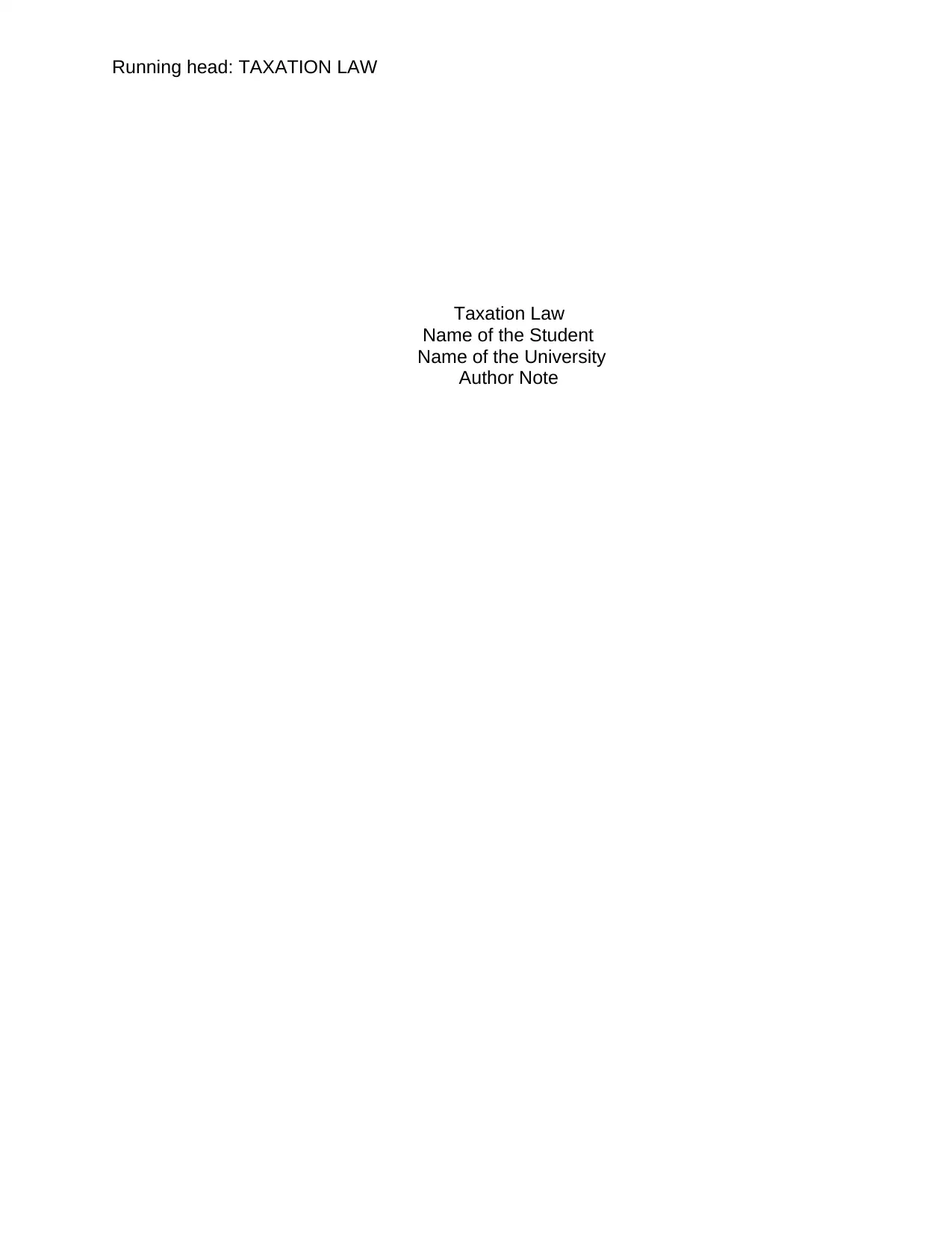
Running head: TAXATION LAW
Taxation Law
Name of the Student
Name of the University
Author Note
Taxation Law
Name of the Student
Name of the University
Author Note
Paraphrase This Document
Need a fresh take? Get an instant paraphrase of this document with our AI Paraphraser
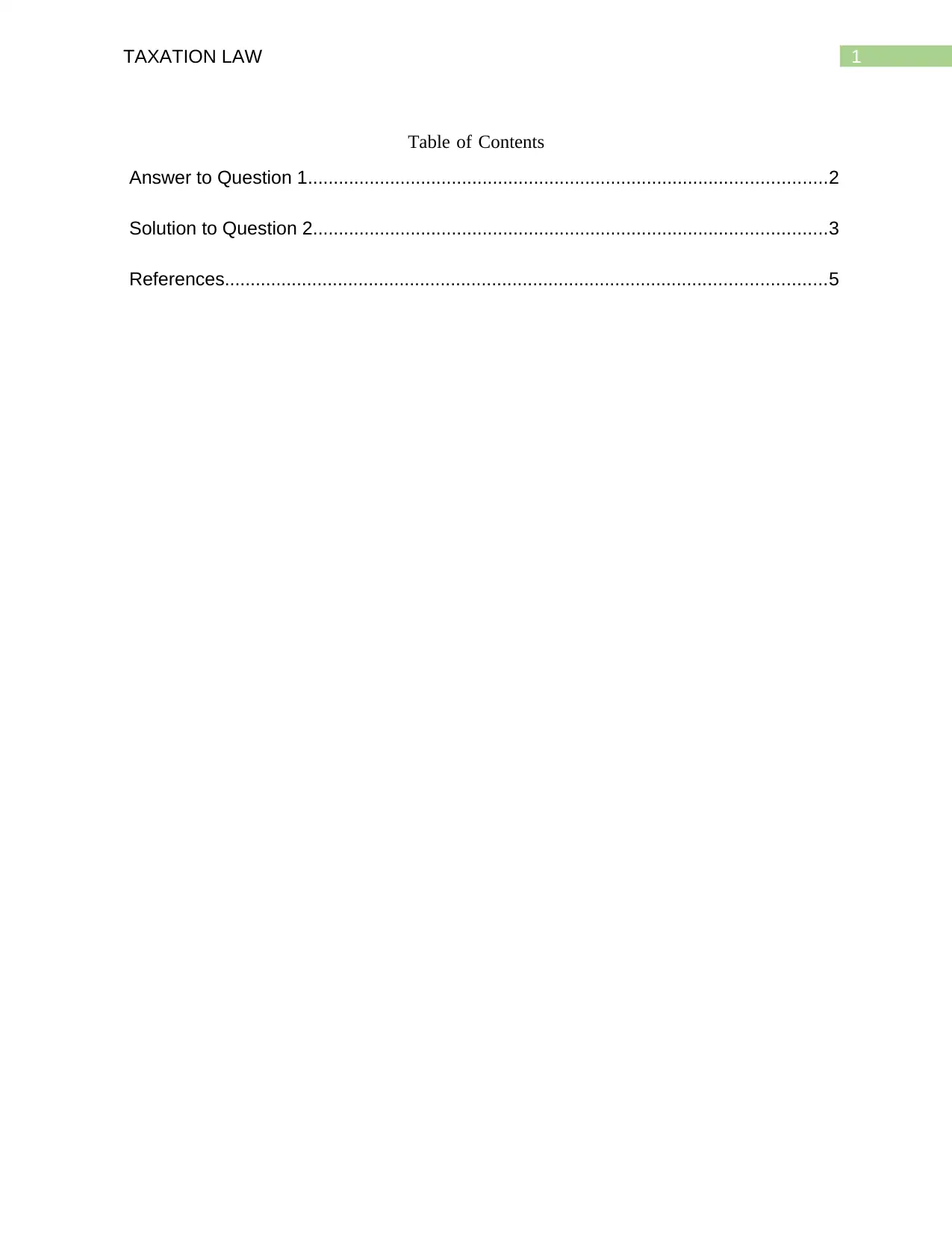
1TAXATION LAW
Table of Contents
Answer to Question 1.....................................................................................................2
Solution to Question 2....................................................................................................3
References.....................................................................................................................5
Table of Contents
Answer to Question 1.....................................................................................................2
Solution to Question 2....................................................................................................3
References.....................................................................................................................5
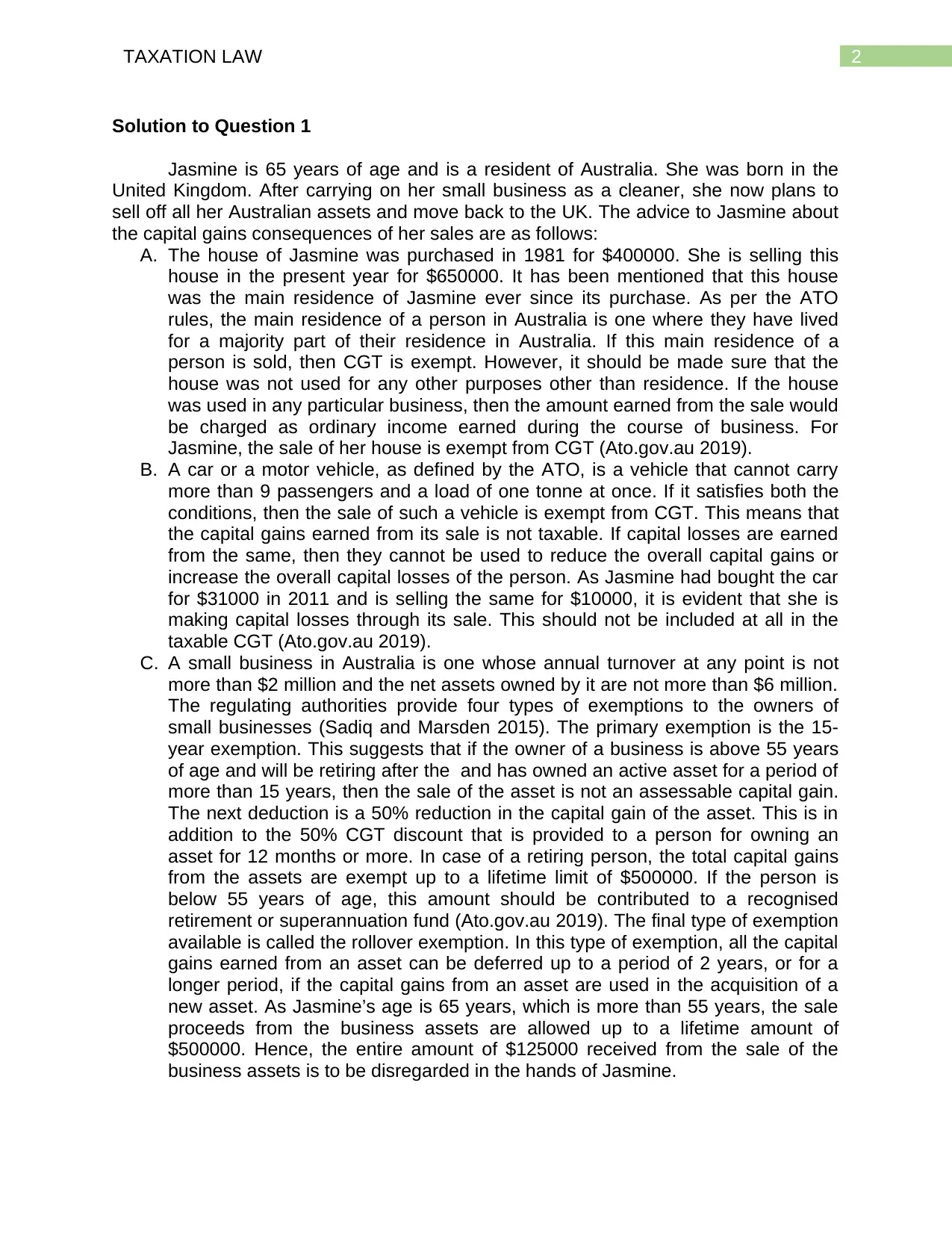
2TAXATION LAW
Solution to Question 1
Jasmine is 65 years of age and is a resident of Australia. She was born in the
United Kingdom. After carrying on her small business as a cleaner, she now plans to
sell off all her Australian assets and move back to the UK. The advice to Jasmine about
the capital gains consequences of her sales are as follows:
A. The house of Jasmine was purchased in 1981 for $400000. She is selling this
house in the present year for $650000. It has been mentioned that this house
was the main residence of Jasmine ever since its purchase. As per the ATO
rules, the main residence of a person in Australia is one where they have lived
for a majority part of their residence in Australia. If this main residence of a
person is sold, then CGT is exempt. However, it should be made sure that the
house was not used for any other purposes other than residence. If the house
was used in any particular business, then the amount earned from the sale would
be charged as ordinary income earned during the course of business. For
Jasmine, the sale of her house is exempt from CGT (Ato.gov.au 2019).
B. A car or a motor vehicle, as defined by the ATO, is a vehicle that cannot carry
more than 9 passengers and a load of one tonne at once. If it satisfies both the
conditions, then the sale of such a vehicle is exempt from CGT. This means that
the capital gains earned from its sale is not taxable. If capital losses are earned
from the same, then they cannot be used to reduce the overall capital gains or
increase the overall capital losses of the person. As Jasmine had bought the car
for $31000 in 2011 and is selling the same for $10000, it is evident that she is
making capital losses through its sale. This should not be included at all in the
taxable CGT (Ato.gov.au 2019).
C. A small business in Australia is one whose annual turnover at any point is not
more than $2 million and the net assets owned by it are not more than $6 million.
The regulating authorities provide four types of exemptions to the owners of
small businesses (Sadiq and Marsden 2015). The primary exemption is the 15-
year exemption. This suggests that if the owner of a business is above 55 years
of age and will be retiring after the and has owned an active asset for a period of
more than 15 years, then the sale of the asset is not an assessable capital gain.
The next deduction is a 50% reduction in the capital gain of the asset. This is in
addition to the 50% CGT discount that is provided to a person for owning an
asset for 12 months or more. In case of a retiring person, the total capital gains
from the assets are exempt up to a lifetime limit of $500000. If the person is
below 55 years of age, this amount should be contributed to a recognised
retirement or superannuation fund (Ato.gov.au 2019). The final type of exemption
available is called the rollover exemption. In this type of exemption, all the capital
gains earned from an asset can be deferred up to a period of 2 years, or for a
longer period, if the capital gains from an asset are used in the acquisition of a
new asset. As Jasmine’s age is 65 years, which is more than 55 years, the sale
proceeds from the business assets are allowed up to a lifetime amount of
$500000. Hence, the entire amount of $125000 received from the sale of the
business assets is to be disregarded in the hands of Jasmine.
Solution to Question 1
Jasmine is 65 years of age and is a resident of Australia. She was born in the
United Kingdom. After carrying on her small business as a cleaner, she now plans to
sell off all her Australian assets and move back to the UK. The advice to Jasmine about
the capital gains consequences of her sales are as follows:
A. The house of Jasmine was purchased in 1981 for $400000. She is selling this
house in the present year for $650000. It has been mentioned that this house
was the main residence of Jasmine ever since its purchase. As per the ATO
rules, the main residence of a person in Australia is one where they have lived
for a majority part of their residence in Australia. If this main residence of a
person is sold, then CGT is exempt. However, it should be made sure that the
house was not used for any other purposes other than residence. If the house
was used in any particular business, then the amount earned from the sale would
be charged as ordinary income earned during the course of business. For
Jasmine, the sale of her house is exempt from CGT (Ato.gov.au 2019).
B. A car or a motor vehicle, as defined by the ATO, is a vehicle that cannot carry
more than 9 passengers and a load of one tonne at once. If it satisfies both the
conditions, then the sale of such a vehicle is exempt from CGT. This means that
the capital gains earned from its sale is not taxable. If capital losses are earned
from the same, then they cannot be used to reduce the overall capital gains or
increase the overall capital losses of the person. As Jasmine had bought the car
for $31000 in 2011 and is selling the same for $10000, it is evident that she is
making capital losses through its sale. This should not be included at all in the
taxable CGT (Ato.gov.au 2019).
C. A small business in Australia is one whose annual turnover at any point is not
more than $2 million and the net assets owned by it are not more than $6 million.
The regulating authorities provide four types of exemptions to the owners of
small businesses (Sadiq and Marsden 2015). The primary exemption is the 15-
year exemption. This suggests that if the owner of a business is above 55 years
of age and will be retiring after the and has owned an active asset for a period of
more than 15 years, then the sale of the asset is not an assessable capital gain.
The next deduction is a 50% reduction in the capital gain of the asset. This is in
addition to the 50% CGT discount that is provided to a person for owning an
asset for 12 months or more. In case of a retiring person, the total capital gains
from the assets are exempt up to a lifetime limit of $500000. If the person is
below 55 years of age, this amount should be contributed to a recognised
retirement or superannuation fund (Ato.gov.au 2019). The final type of exemption
available is called the rollover exemption. In this type of exemption, all the capital
gains earned from an asset can be deferred up to a period of 2 years, or for a
longer period, if the capital gains from an asset are used in the acquisition of a
new asset. As Jasmine’s age is 65 years, which is more than 55 years, the sale
proceeds from the business assets are allowed up to a lifetime amount of
$500000. Hence, the entire amount of $125000 received from the sale of the
business assets is to be disregarded in the hands of Jasmine.
⊘ This is a preview!⊘
Do you want full access?
Subscribe today to unlock all pages.

Trusted by 1+ million students worldwide
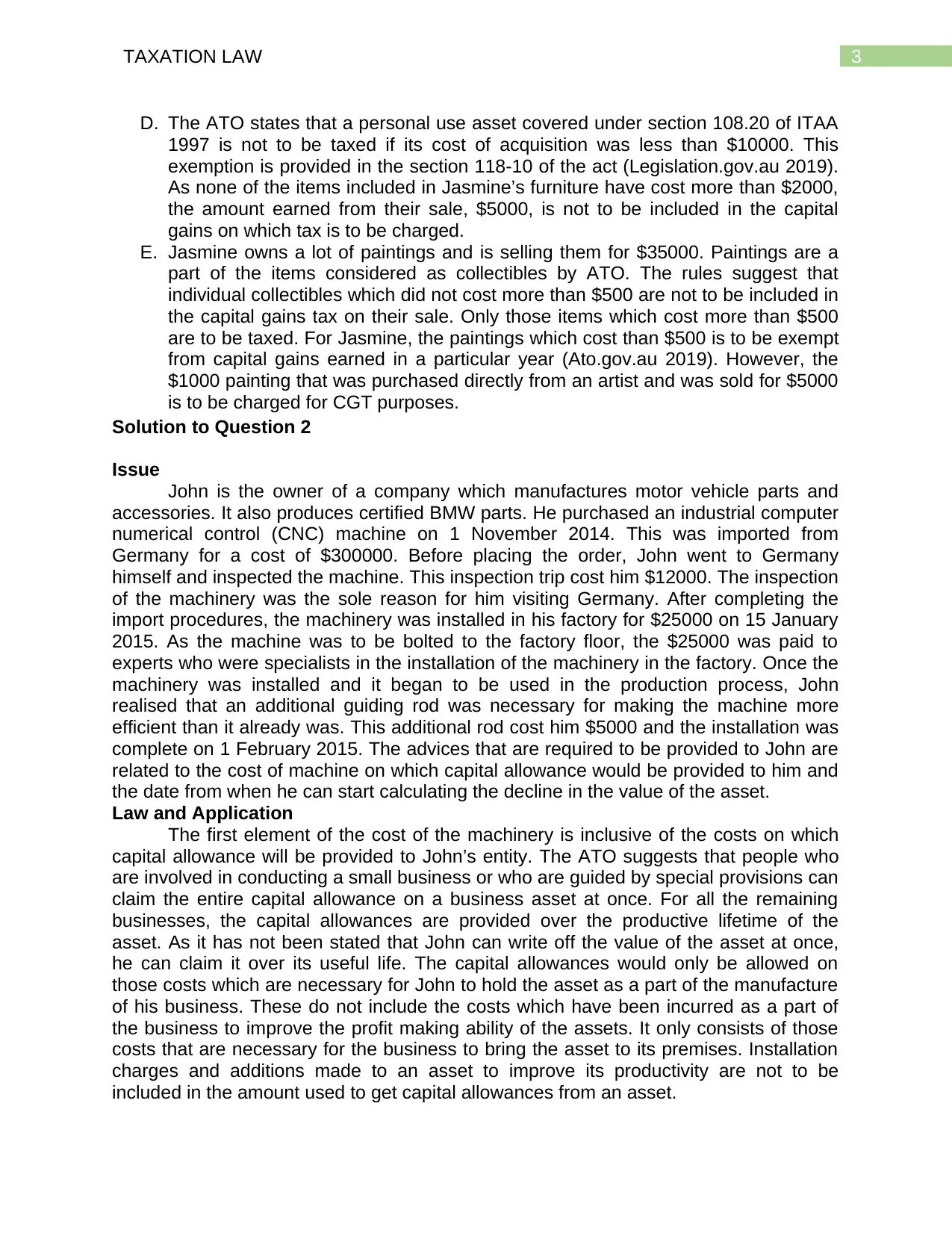
3TAXATION LAW
D. The ATO states that a personal use asset covered under section 108.20 of ITAA
1997 is not to be taxed if its cost of acquisition was less than $10000. This
exemption is provided in the section 118-10 of the act (Legislation.gov.au 2019).
As none of the items included in Jasmine’s furniture have cost more than $2000,
the amount earned from their sale, $5000, is not to be included in the capital
gains on which tax is to be charged.
E. Jasmine owns a lot of paintings and is selling them for $35000. Paintings are a
part of the items considered as collectibles by ATO. The rules suggest that
individual collectibles which did not cost more than $500 are not to be included in
the capital gains tax on their sale. Only those items which cost more than $500
are to be taxed. For Jasmine, the paintings which cost than $500 is to be exempt
from capital gains earned in a particular year (Ato.gov.au 2019). However, the
$1000 painting that was purchased directly from an artist and was sold for $5000
is to be charged for CGT purposes.
Solution to Question 2
Issue
John is the owner of a company which manufactures motor vehicle parts and
accessories. It also produces certified BMW parts. He purchased an industrial computer
numerical control (CNC) machine on 1 November 2014. This was imported from
Germany for a cost of $300000. Before placing the order, John went to Germany
himself and inspected the machine. This inspection trip cost him $12000. The inspection
of the machinery was the sole reason for him visiting Germany. After completing the
import procedures, the machinery was installed in his factory for $25000 on 15 January
2015. As the machine was to be bolted to the factory floor, the $25000 was paid to
experts who were specialists in the installation of the machinery in the factory. Once the
machinery was installed and it began to be used in the production process, John
realised that an additional guiding rod was necessary for making the machine more
efficient than it already was. This additional rod cost him $5000 and the installation was
complete on 1 February 2015. The advices that are required to be provided to John are
related to the cost of machine on which capital allowance would be provided to him and
the date from when he can start calculating the decline in the value of the asset.
Law and Application
The first element of the cost of the machinery is inclusive of the costs on which
capital allowance will be provided to John’s entity. The ATO suggests that people who
are involved in conducting a small business or who are guided by special provisions can
claim the entire capital allowance on a business asset at once. For all the remaining
businesses, the capital allowances are provided over the productive lifetime of the
asset. As it has not been stated that John can write off the value of the asset at once,
he can claim it over its useful life. The capital allowances would only be allowed on
those costs which are necessary for John to hold the asset as a part of the manufacture
of his business. These do not include the costs which have been incurred as a part of
the business to improve the profit making ability of the assets. It only consists of those
costs that are necessary for the business to bring the asset to its premises. Installation
charges and additions made to an asset to improve its productivity are not to be
included in the amount used to get capital allowances from an asset.
D. The ATO states that a personal use asset covered under section 108.20 of ITAA
1997 is not to be taxed if its cost of acquisition was less than $10000. This
exemption is provided in the section 118-10 of the act (Legislation.gov.au 2019).
As none of the items included in Jasmine’s furniture have cost more than $2000,
the amount earned from their sale, $5000, is not to be included in the capital
gains on which tax is to be charged.
E. Jasmine owns a lot of paintings and is selling them for $35000. Paintings are a
part of the items considered as collectibles by ATO. The rules suggest that
individual collectibles which did not cost more than $500 are not to be included in
the capital gains tax on their sale. Only those items which cost more than $500
are to be taxed. For Jasmine, the paintings which cost than $500 is to be exempt
from capital gains earned in a particular year (Ato.gov.au 2019). However, the
$1000 painting that was purchased directly from an artist and was sold for $5000
is to be charged for CGT purposes.
Solution to Question 2
Issue
John is the owner of a company which manufactures motor vehicle parts and
accessories. It also produces certified BMW parts. He purchased an industrial computer
numerical control (CNC) machine on 1 November 2014. This was imported from
Germany for a cost of $300000. Before placing the order, John went to Germany
himself and inspected the machine. This inspection trip cost him $12000. The inspection
of the machinery was the sole reason for him visiting Germany. After completing the
import procedures, the machinery was installed in his factory for $25000 on 15 January
2015. As the machine was to be bolted to the factory floor, the $25000 was paid to
experts who were specialists in the installation of the machinery in the factory. Once the
machinery was installed and it began to be used in the production process, John
realised that an additional guiding rod was necessary for making the machine more
efficient than it already was. This additional rod cost him $5000 and the installation was
complete on 1 February 2015. The advices that are required to be provided to John are
related to the cost of machine on which capital allowance would be provided to him and
the date from when he can start calculating the decline in the value of the asset.
Law and Application
The first element of the cost of the machinery is inclusive of the costs on which
capital allowance will be provided to John’s entity. The ATO suggests that people who
are involved in conducting a small business or who are guided by special provisions can
claim the entire capital allowance on a business asset at once. For all the remaining
businesses, the capital allowances are provided over the productive lifetime of the
asset. As it has not been stated that John can write off the value of the asset at once,
he can claim it over its useful life. The capital allowances would only be allowed on
those costs which are necessary for John to hold the asset as a part of the manufacture
of his business. These do not include the costs which have been incurred as a part of
the business to improve the profit making ability of the assets. It only consists of those
costs that are necessary for the business to bring the asset to its premises. Installation
charges and additions made to an asset to improve its productivity are not to be
included in the amount used to get capital allowances from an asset.
Paraphrase This Document
Need a fresh take? Get an instant paraphrase of this document with our AI Paraphraser
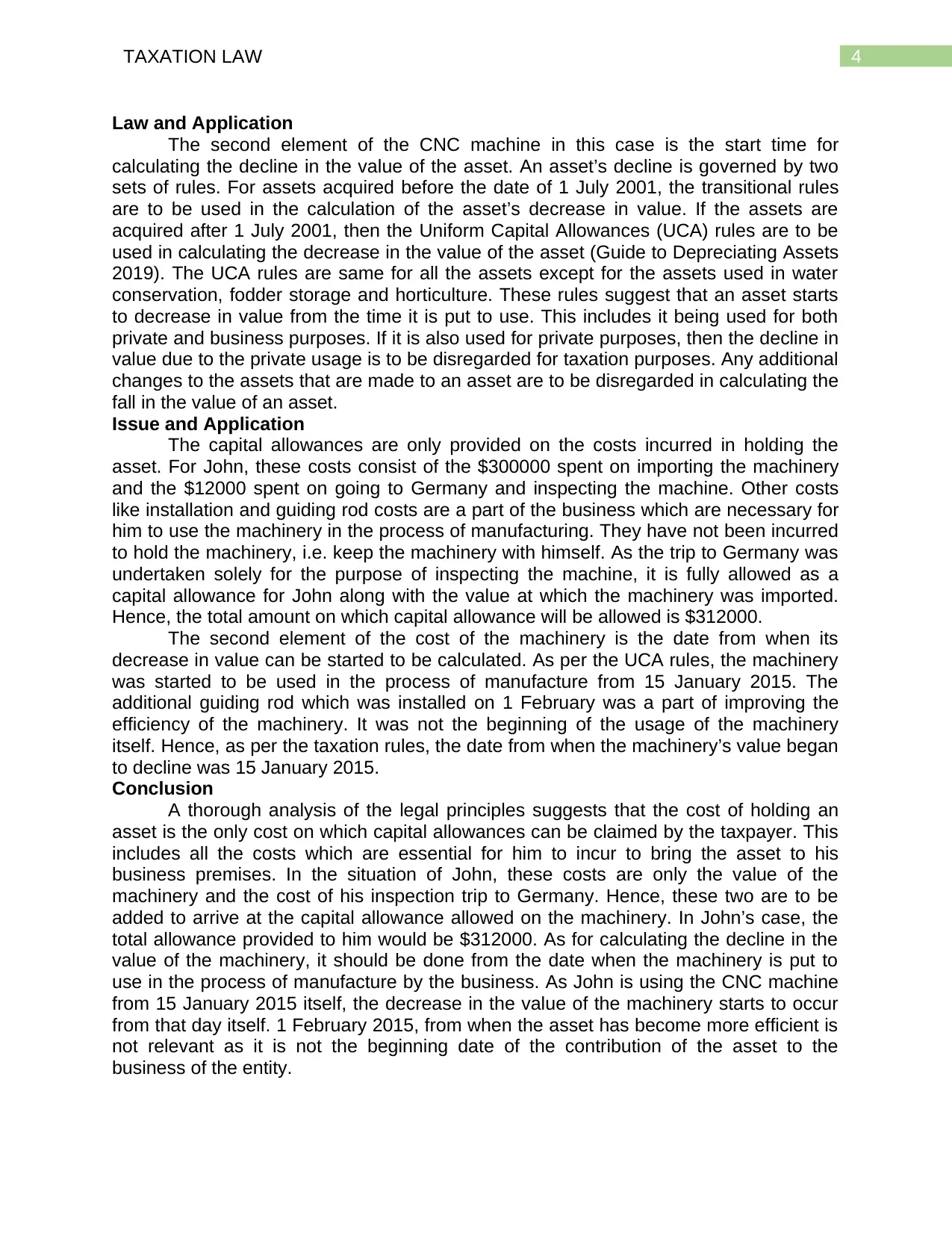
4TAXATION LAW
Law and Application
The second element of the CNC machine in this case is the start time for
calculating the decline in the value of the asset. An asset’s decline is governed by two
sets of rules. For assets acquired before the date of 1 July 2001, the transitional rules
are to be used in the calculation of the asset’s decrease in value. If the assets are
acquired after 1 July 2001, then the Uniform Capital Allowances (UCA) rules are to be
used in calculating the decrease in the value of the asset (Guide to Depreciating Assets
2019). The UCA rules are same for all the assets except for the assets used in water
conservation, fodder storage and horticulture. These rules suggest that an asset starts
to decrease in value from the time it is put to use. This includes it being used for both
private and business purposes. If it is also used for private purposes, then the decline in
value due to the private usage is to be disregarded for taxation purposes. Any additional
changes to the assets that are made to an asset are to be disregarded in calculating the
fall in the value of an asset.
Issue and Application
The capital allowances are only provided on the costs incurred in holding the
asset. For John, these costs consist of the $300000 spent on importing the machinery
and the $12000 spent on going to Germany and inspecting the machine. Other costs
like installation and guiding rod costs are a part of the business which are necessary for
him to use the machinery in the process of manufacturing. They have not been incurred
to hold the machinery, i.e. keep the machinery with himself. As the trip to Germany was
undertaken solely for the purpose of inspecting the machine, it is fully allowed as a
capital allowance for John along with the value at which the machinery was imported.
Hence, the total amount on which capital allowance will be allowed is $312000.
The second element of the cost of the machinery is the date from when its
decrease in value can be started to be calculated. As per the UCA rules, the machinery
was started to be used in the process of manufacture from 15 January 2015. The
additional guiding rod which was installed on 1 February was a part of improving the
efficiency of the machinery. It was not the beginning of the usage of the machinery
itself. Hence, as per the taxation rules, the date from when the machinery’s value began
to decline was 15 January 2015.
Conclusion
A thorough analysis of the legal principles suggests that the cost of holding an
asset is the only cost on which capital allowances can be claimed by the taxpayer. This
includes all the costs which are essential for him to incur to bring the asset to his
business premises. In the situation of John, these costs are only the value of the
machinery and the cost of his inspection trip to Germany. Hence, these two are to be
added to arrive at the capital allowance allowed on the machinery. In John’s case, the
total allowance provided to him would be $312000. As for calculating the decline in the
value of the machinery, it should be done from the date when the machinery is put to
use in the process of manufacture by the business. As John is using the CNC machine
from 15 January 2015 itself, the decrease in the value of the machinery starts to occur
from that day itself. 1 February 2015, from when the asset has become more efficient is
not relevant as it is not the beginning date of the contribution of the asset to the
business of the entity.
Law and Application
The second element of the CNC machine in this case is the start time for
calculating the decline in the value of the asset. An asset’s decline is governed by two
sets of rules. For assets acquired before the date of 1 July 2001, the transitional rules
are to be used in the calculation of the asset’s decrease in value. If the assets are
acquired after 1 July 2001, then the Uniform Capital Allowances (UCA) rules are to be
used in calculating the decrease in the value of the asset (Guide to Depreciating Assets
2019). The UCA rules are same for all the assets except for the assets used in water
conservation, fodder storage and horticulture. These rules suggest that an asset starts
to decrease in value from the time it is put to use. This includes it being used for both
private and business purposes. If it is also used for private purposes, then the decline in
value due to the private usage is to be disregarded for taxation purposes. Any additional
changes to the assets that are made to an asset are to be disregarded in calculating the
fall in the value of an asset.
Issue and Application
The capital allowances are only provided on the costs incurred in holding the
asset. For John, these costs consist of the $300000 spent on importing the machinery
and the $12000 spent on going to Germany and inspecting the machine. Other costs
like installation and guiding rod costs are a part of the business which are necessary for
him to use the machinery in the process of manufacturing. They have not been incurred
to hold the machinery, i.e. keep the machinery with himself. As the trip to Germany was
undertaken solely for the purpose of inspecting the machine, it is fully allowed as a
capital allowance for John along with the value at which the machinery was imported.
Hence, the total amount on which capital allowance will be allowed is $312000.
The second element of the cost of the machinery is the date from when its
decrease in value can be started to be calculated. As per the UCA rules, the machinery
was started to be used in the process of manufacture from 15 January 2015. The
additional guiding rod which was installed on 1 February was a part of improving the
efficiency of the machinery. It was not the beginning of the usage of the machinery
itself. Hence, as per the taxation rules, the date from when the machinery’s value began
to decline was 15 January 2015.
Conclusion
A thorough analysis of the legal principles suggests that the cost of holding an
asset is the only cost on which capital allowances can be claimed by the taxpayer. This
includes all the costs which are essential for him to incur to bring the asset to his
business premises. In the situation of John, these costs are only the value of the
machinery and the cost of his inspection trip to Germany. Hence, these two are to be
added to arrive at the capital allowance allowed on the machinery. In John’s case, the
total allowance provided to him would be $312000. As for calculating the decline in the
value of the machinery, it should be done from the date when the machinery is put to
use in the process of manufacture by the business. As John is using the CNC machine
from 15 January 2015 itself, the decrease in the value of the machinery starts to occur
from that day itself. 1 February 2015, from when the asset has become more efficient is
not relevant as it is not the beginning date of the contribution of the asset to the
business of the entity.
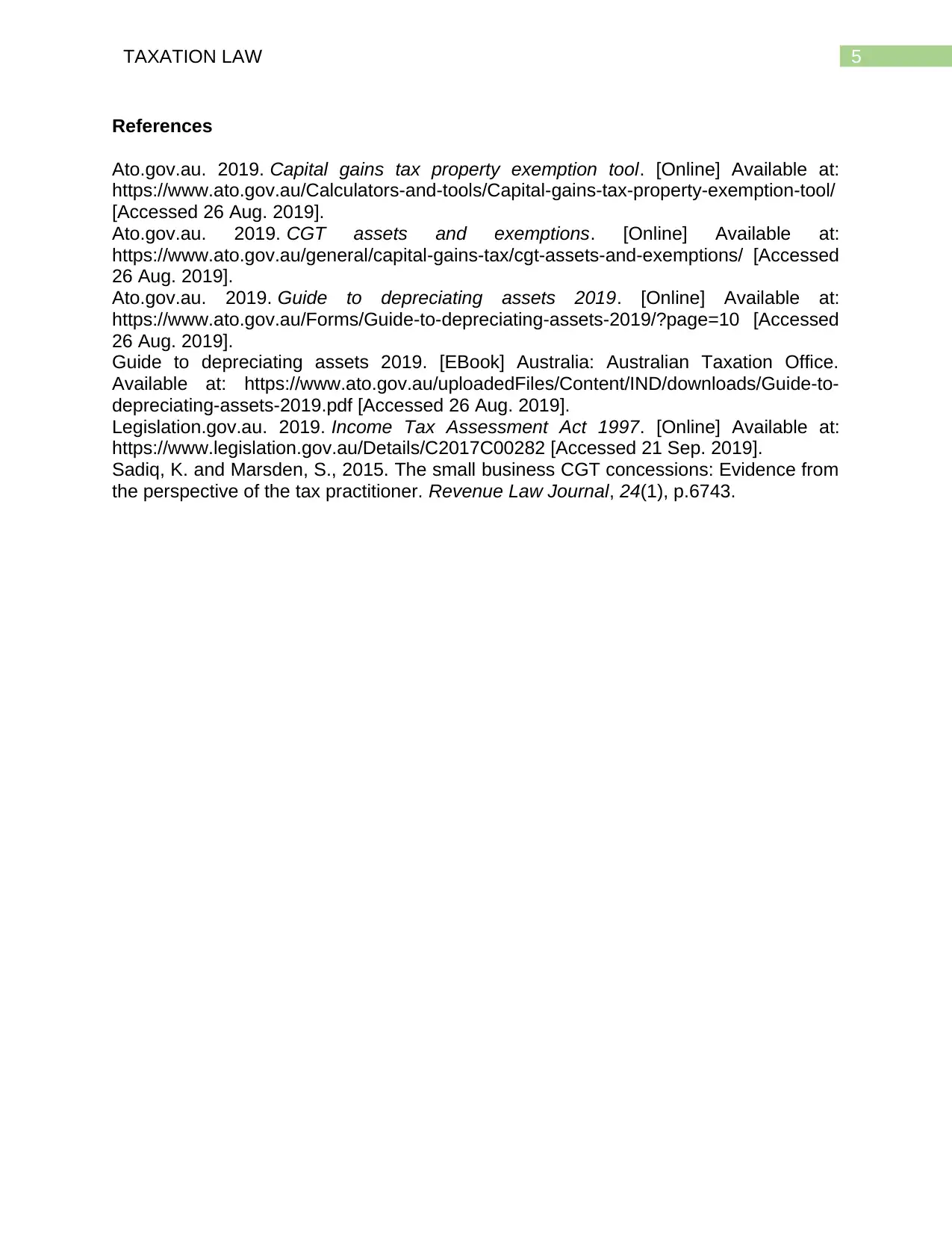
5TAXATION LAW
References
Ato.gov.au. 2019. Capital gains tax property exemption tool. [Online] Available at:
https://www.ato.gov.au/Calculators-and-tools/Capital-gains-tax-property-exemption-tool/
[Accessed 26 Aug. 2019].
Ato.gov.au. 2019. CGT assets and exemptions. [Online] Available at:
https://www.ato.gov.au/general/capital-gains-tax/cgt-assets-and-exemptions/ [Accessed
26 Aug. 2019].
Ato.gov.au. 2019. Guide to depreciating assets 2019. [Online] Available at:
https://www.ato.gov.au/Forms/Guide-to-depreciating-assets-2019/?page=10 [Accessed
26 Aug. 2019].
Guide to depreciating assets 2019. [EBook] Australia: Australian Taxation Office.
Available at: https://www.ato.gov.au/uploadedFiles/Content/IND/downloads/Guide-to-
depreciating-assets-2019.pdf [Accessed 26 Aug. 2019].
Legislation.gov.au. 2019. Income Tax Assessment Act 1997. [Online] Available at:
https://www.legislation.gov.au/Details/C2017C00282 [Accessed 21 Sep. 2019].
Sadiq, K. and Marsden, S., 2015. The small business CGT concessions: Evidence from
the perspective of the tax practitioner. Revenue Law Journal, 24(1), p.6743.
References
Ato.gov.au. 2019. Capital gains tax property exemption tool. [Online] Available at:
https://www.ato.gov.au/Calculators-and-tools/Capital-gains-tax-property-exemption-tool/
[Accessed 26 Aug. 2019].
Ato.gov.au. 2019. CGT assets and exemptions. [Online] Available at:
https://www.ato.gov.au/general/capital-gains-tax/cgt-assets-and-exemptions/ [Accessed
26 Aug. 2019].
Ato.gov.au. 2019. Guide to depreciating assets 2019. [Online] Available at:
https://www.ato.gov.au/Forms/Guide-to-depreciating-assets-2019/?page=10 [Accessed
26 Aug. 2019].
Guide to depreciating assets 2019. [EBook] Australia: Australian Taxation Office.
Available at: https://www.ato.gov.au/uploadedFiles/Content/IND/downloads/Guide-to-
depreciating-assets-2019.pdf [Accessed 26 Aug. 2019].
Legislation.gov.au. 2019. Income Tax Assessment Act 1997. [Online] Available at:
https://www.legislation.gov.au/Details/C2017C00282 [Accessed 21 Sep. 2019].
Sadiq, K. and Marsden, S., 2015. The small business CGT concessions: Evidence from
the perspective of the tax practitioner. Revenue Law Journal, 24(1), p.6743.
⊘ This is a preview!⊘
Do you want full access?
Subscribe today to unlock all pages.

Trusted by 1+ million students worldwide
1 out of 6
Related Documents
Your All-in-One AI-Powered Toolkit for Academic Success.
+13062052269
info@desklib.com
Available 24*7 on WhatsApp / Email
![[object Object]](/_next/static/media/star-bottom.7253800d.svg)
Unlock your academic potential
Copyright © 2020–2026 A2Z Services. All Rights Reserved. Developed and managed by ZUCOL.





